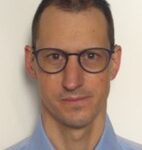
Marco Tettamanti, Ph.D., Associate Professor in Psychobiology and Psychophysiology. In 1996, he got an M.Sc. in neurobiology and molecular biology at the Biozentrum of the University of Basel, Switzerland. In 2004, he got a Ph.D. in Neuroscience at the University of Zürich, Switzerland. From 2004 to 2018, he has been a tenured full-time IRCCS research fellow at the San Raffaele Scientific Institute, Milano, Italy. From 2018 to 2022, he was Associate Professor at the Center for Mind/Brain Sciences (CIMeC), University of Trento, Italy. In 2022, he moved to the University of Milano-Bicocca.
His research is mainly focused on the neurobiology of language, combining psycholinguistics, psychophysics, neuropsychological, and cognitive-computational methods with multimodal neuroimaging techniques (MRI, MEG, EEG, TMS) to understand the neural mechanisms underlying normal and pathological language functions and language development.